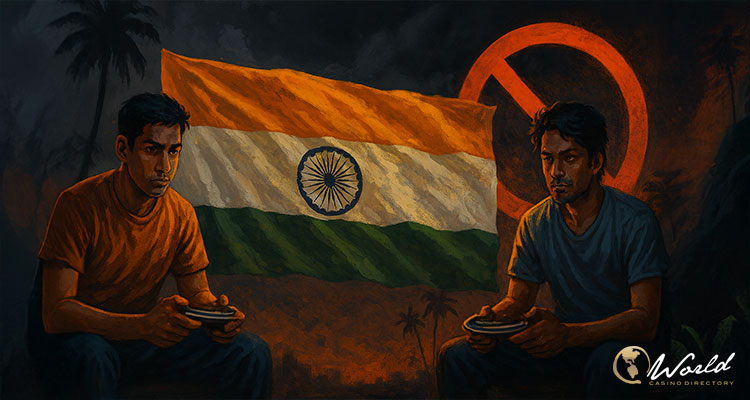India’s decision to outlaw online gambling has upended a multibillion-dollar industry, sent shockwaves through the sporting world, and left millions of players seeking alternatives abroad. While the law aims to curb addiction and financial harm, critics argue it will instead drive gambling further into the shadows of unregulated overseas markets.
Last month, parliament enacted the Promotion and Regulation of Online Gaming Bill 2025, which prohibits real-money online play and promotion of such platforms. The legislation came in response to government data indicating that 450 million Indians—roughly a third of the population—collectively lost about $2.3 billion annually to online gambling.
The new law carries steep consequences: offenders face up to five years in prison, while banks and payment providers are barred from processing cash transactions tied to these games. Technology Minister Ashwini Vaishnaw stressed that the distinction between eSports and gambling was central, noting that the bill separates “betting, gambling and fantasy money games that exploit users with false promises of profit” from legitimate online competitions.
Supporters contend the ban is a necessary measure to address rising cases of addiction, financial distress, and suicides linked to gambling losses. Vaishnaw warned that “the middle class loses all their earnings” and highlighted a growing number of tragedies involving families torn apart by online betting.
Players Find Loopholes Through Offshore Platforms
Despite the clampdown, gamblers remain undeterred. With domestic operators shuttered, many are turning to unregulated offshore websites accessible via virtual private networks (VPNs) and proxy credit cards.
Adarsh Sharma, an advertising professional and long-time fantasy sports player, predicted that international sites will “see a sudden boom” as Indians adapt to the restrictions. “A habit once formed cannot be broken easily,” he explained, according to Agence France-Presse. “It is an addiction and people will find ways to gamble.”
One anonymous player told AFP that the shift was inevitable: “We have done this before and will do it again. We will go back to our old ways of making money.”
Analysts caution that this trend could worsen the very issues the law seeks to address, as offshore platforms operate beyond Indian jurisdiction and lack consumer protections.
Fantasy Sports and Cricket Industry Hit Hard
The ban has also delivered a heavy financial blow to India’s fantasy sports sector, valued at nearly £1.8 billion before the crackdown. Dream11, the country’s largest fantasy gaming operator with 260 million users, has ended all cash-based contests and now offers non-monetary rewards such as gadgets, cars, and appliances.
The company quickly terminated its £34 million ($43 million) sponsorship deal with the Board of Control for Cricket in India (BCCI), leaving Indian players’ jerseys without its branding. CEO Harsh Jain admitted the sudden passage of the law blindsided the industry, saying, “The entire industry was caught off guard… By Friday the president had signed it into law. It was a complete shock.”
Fantasy platforms were previously among the most aggressive advertisers in cricket, contributing as much as 40 percent of the Indian Premier League’s (IPL) broadcast advertising revenues. With their exit, experts warn that IPL valuations may decline when media rights are renegotiated in 2027, reducing funds available to teams and organizers.
“Fantasy platforms are the most aggressive advertisers in IPL and world cricket,” analyst Karan Taurani noted, suggesting these companies may now redirect efforts overseas. Santosh N. of D and P Advisory added that their absence will hit broadcasters directly: “The fantasy guys will obviously reduce their ad spends because their business model is at stake—or actually destroyed due to the ban.”
Legal and Economic Challenges Ahead
Unsurprisingly, the law has already sparked legal pushback. Indian card game operator A23 has filed a constitutional challenge, while policy experts argue that the legislation undermines consumer safety by dismantling regulated domestic firms while inadvertently boosting black-market operators.
“The law fails the test of proportionality,” said Meghna Bal of the Esya Centre think tank. “Instead of safeguarding consumers, it dismantles compliant onshore companies while opening the door wider for illegal offshore betting platforms that are the real source of financial harm.”
Other critics point to the rushed nature of the bill’s passage. Rohit Kumar of Quantum Hub argued that “abrupt moves like this undermine India’s reputation as a stable, predictable investment destination.”
Meanwhile, Dream11’s Harsh Jain admitted that the industry bears some responsibility for not uniting earlier under strong self-regulation to protect players and exclude predatory operators. Still, he warned that bans historically feed black markets, with offshore firms already targeting Indian users with promotions.
A Redrawn Gaming Landscape
India’s ban on online gambling has transformed the country’s digital gaming and sporting economy almost overnight. What was once a booming fantasy sports sector intertwined with cricket sponsorships now faces an uncertain future.
For fans like Delhi butcher Jamshed Noor, the passion for fantasy cricket endures despite the loss of cash prizes. “We play it for the love of cricket,” he said. “Money was definitely an attraction, but I still play, despite money being off the table now.”
As domestic firms comply with the new restrictions and cricket bodies brace for reduced sponsorship revenues, the government insists the move was necessary to protect vulnerable citizens. Yet, with millions of gamblers migrating offshore, the battle between regulation, enforcement, and consumer demand is far from settled.


